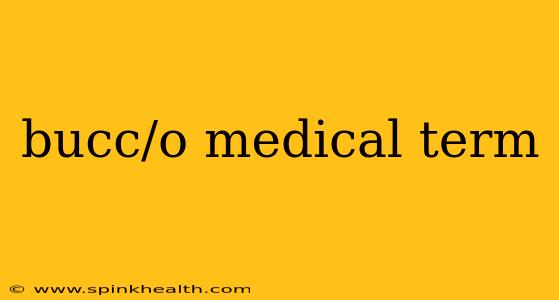Have you ever encountered the term "bucc/o" in a medical context and found yourself scratching your head? It's a common root used in many medical terms, often appearing alongside other prefixes and suffixes to describe specific conditions or procedures. Let's unravel the mystery of "bucc/o" and explore its significance in the world of medicine.
Imagine you're a medical student, diligently poring over textbooks, or perhaps a curious individual seeking to understand a medical diagnosis. Suddenly, you encounter "bucc/o." This seemingly cryptic word fragment holds the key to understanding a range of conditions relating to a specific part of the human anatomy.
The simple truth is that bucc/o is a combining form, a word part that's combined with other parts to create a more comprehensive medical term. It directly relates to the cheek, or more precisely, the mouth and cheek.
What body parts does bucc/o refer to?
Bucc/o specifically refers to the bucca, the Latin word for cheek. However, its usage often extends to encompass the structures and functions closely associated with the cheeks, including the mouth and the area around it. This broader interpretation is crucial in understanding the medical terms it forms a part of.
What are some medical terms that use bucc/o?
Now that we understand the core meaning, let's delve into some examples of medical terms containing "bucc/o":
-
Buccal: This adjective describes something related to the cheek. For example, "buccal mucosa" refers to the mucous membrane lining the inner surface of the cheek. A doctor might prescribe a "buccal tablet," a medication designed to be dissolved in the cheek pouch.
-
Buccinator: This term refers to a specific muscle in the face. The buccinator muscle is a significant player in chewing and facial expression. It's one of those muscles that allows us to whistle, blow, and even suck on a straw.
-
Buccal cavity: This term describes the space within the mouth. While related to the cheek, it's a broader term encompassing the entire oral cavity.
What conditions or procedures involve bucc/o?
Several conditions and procedures involve the cheek or the buccal region. These might include:
- Buccal cellulitis: An infection of the soft tissues of the cheek.
- Buccal hematoma: A collection of blood in the cheek tissue, often caused by trauma.
- Buccal surgery: Surgical procedures performed on the cheeks, which can involve various procedures like the removal of tumors or reconstruction after trauma.
How is bucc/o used in clinical practice?
In a clinical setting, understanding "bucc/o" is vital for accurate communication. Doctors use these terms to pinpoint the location of a problem or to describe the intended area for a procedure. For example, a dentist might mention "buccal decay" to refer to tooth decay affecting the cheek-facing surface of a tooth.
Why is understanding bucc/o important?
Understanding medical terminology, including combining forms like "bucc/o," empowers both medical professionals and patients. It aids in clear communication, enhances understanding of diagnoses and treatments, and ultimately, promotes better healthcare outcomes.
This knowledge allows patients to actively engage in their healthcare discussions, posing informed questions and ensuring complete comprehension of their medical situations.
By understanding the meaning and implications of "bucc/o," we gain a deeper appreciation for the complexity and precision of medical language, furthering our understanding of the human body and the fascinating field of medicine.

